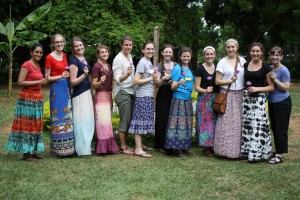
2014 Malini Summer Fellows pose with their parting gift from a village school in lunugamvehera, Sri Lanka.
This summer, I had the wonderful opportunity of traveling to Sri Lanka with ten scholars from the honors college. Although we each came from different academic backgrounds, we had all been chosen to be Malini Summer Fellows because of our passion and will to fight for educational opportunities and equal rights for women and girls. For twelve days, we toured Sri Lanka, learned about nonprofit and non-governmental organizations, and ran creative arts and reading workshops with about 150 children.
One day while riding on the bus, our mentor and CEO of the Malini Foundation, Valerie Handunge, spoke with us about her nonprofit and social entrepreneurship theory. In words more eloquent than these, she explained to us that running a few two day workshops in Sri Lanka wouldn’t change the world. I knew that what she said was true, and her honesty was refreshing.
Still, I remained confident that my time in Sri Lanka was well spent. Our creative arts and reading workshops, which were fun for the children and for the group of fellows, were also a key piece of the Malini Foundation’s participatory approach to social justice work. By reaching out to communities, Valerie builds relationships with communities and trust is established. Our creative arts and reading workshops were just one component of the community outreach approach. Though our time with these children represents only a drop in the bucket in terms of the time and effort that is necessary to affect change, we went into it knowing that our work was part of a larger plan. Eventually, the time will be right for these women, girls, and their communities to feel empowered themselves.
Unsurprisingly, empowerment was a buzzword on the trip. Upon reflection, I have come to the conclusion that empowerment ultimately comes from within, but that positive outside influences can be a key piece to realizing one’s own prowess. On my trip to Sri Lanka, I joined Valerie and her team of volunteers and interns on their mission to help Sri Lankan women and girls to unleash their potential. Through conversations with Valerie and the group of fellows, I began to assess my own sense of empowerment. I realized that being empowered is an active state. It requires honesty and self acceptance. My own empowerment requires effort and commitment to self growth and to continued flourishing.
This experience has shaped me in more ways than one. Not only do I feel more empowered, but I am also exploring new academic and career opportunities. Next semester, I will continue my work with the Malini Foundation as a senior program development intern. I take pride in this work because it directly facilitates the empowerment of the communities I met this summer. As a result of my efforts, I hope that I can learn and grow to be more empowered myself.
